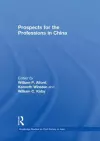
Prospects for the Professions in China
3 contributors - Paperback
£55.99
William P. Alford is Henry L. Stimson Professor at Harvard Law School where he also serves as Vice Dean for the Graduate Program and International Legal Studies, Director of East Asian Legal Studies and Chair of the Harvard Law School Project on Disability. A scholar of Chinese law and society, his books include To Steal a Book is an Elegant Offense: Intellectual Property Law in Chinese Civilization (Stanford 1995); Raising the Bar: The Emerging Legal Profession in East Asia (Harvard 2007), Can ji ren fa lu bao zhang ji zhi yan jiu (A Study of Legal Mechanisms to Protect Persons with Disabilities) (Huaxia 2008, with Wang Liming and Ma Yu’er, in Chinese), Prospects for the Professions in China (Routledge 2011, with William Kirby and Kenneth Winston) and Taiwan and International Human Rights: A Story of Transformation (Springer 2019, with Jerome A. Cohen and Chang-Fa Lo). In addition, he has published dozens of articles concerning China, law and international affairs. Professor Alford’s work has been recognized with an honorary doctorate by the University of Geneva in 2010 and honorary professorships at Renmin University of China and Zhejiang University. He is also the recipient of the inaugural O’Melveny & Myers Centennial Award, the Kluwer China Prize, a Qatar Pearls of Praise Award, an Abe (Japan) Fellowship, the Harvard Law School Alumni Association Award, an award from Special Olympics International recognizing his work on behalf of persons with intellectual disabilities, and several other fellowships and honors. He is a graduate of Amherst College (B.A.), the University of Cambridge (LL.B.), Yale University (M.A. in History and M.A. in Chinese Studies) and Harvard Law School (J.D.).
Mei Liao is an independent scholar at present. From 1996 to 2004, she taught as an assistant professor and associate professor in the History Department of Fudan University in Shanghai. Her research interests include Chinese intellectual history and history of late Qing dynasty. She has published the book Wang Kang-nian: From the Civil Rights Theory to Cultural Conservatism (Shanghai Classics Publishing House, 2001); the novel Under the Tower of Ivory (Jiangsu Literature and Art Publishing House, 2012); and a number of papers. She received her bachelor’s, master’s, and doctoral degrees in history from Fudan University.
Cui Fengming serves as the director of China Program at Harvard Law School Project on Disability. She is also an adjunct professor at China Renmin University School of Law, an honorary professor at Nanjing Normal University of Special Education in China, and a senior fellow of China Renmin University Disability Law Clinic. Her main scholarly interests, academic, and public interest work focus on issues of comparative disability rights studies, disability laws and policies in China; rights in inclusive education, employment, and community for persons with disabilities; family involvement and system support; and the development of civil society for equal participation and general social development. She is an editor for Legal Rights for Persons with Disabilities in China: A Guide Book (China Renmin University Press, 2016, both in Chinese and English, with JianFei Li et al.). Her book chapters and journal articles cover topics concerning inclusive education, equal participation of disabled persons’ organizations and parent organizations, and rights in employment for persons with disabilities in China. She holds an Ed.M. in higher education from Nanjing University in China and an Ed.D. in special education from Boston University in the United States.